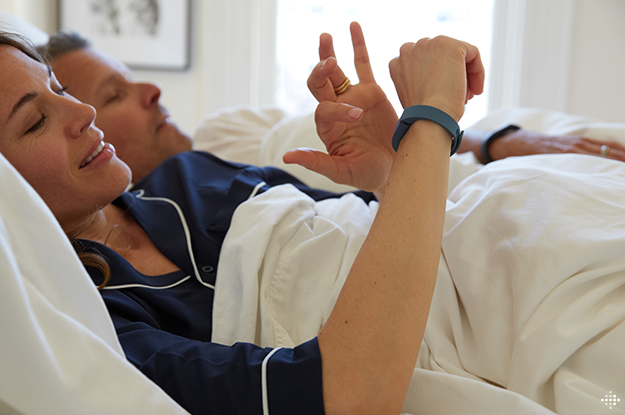Your head just hit the pillow, you’ve finally calmed the voices in your head, and drifted off into dreamland. Ah, it’s bliss… Except for that incessant racket. What is that? An annoying bird? A truck backing up? Nope, it’s the alarm clock. And there’s no room in your morning for the snooze button.
If this scenario sounds familiar, you’re in tired company. According to a survey conducted by YouGov, 45 percent of Americans sleeping 7 to 8 hours each night feel tired or poorly rested up to three times a week. 54 percent of people who clock six or fewer hours say they wake up feeling tired 4 or more days per week. Clearly, the Zzzzombie apocalypse is here!
Silly Sandman references aside, skimping on sleep has a negative impact on your metabolism and can increase your risk for heart disease and diabetes. And it could have a harmful effect on those around you. Research shows drowsy driving is on the rise, and it’s nearly as dangerous as drunk driving—there are at least 100,000 police-reported crashes attributed to driver fatigue each year according to the National Highway Traffic Safety Administration.
What’s a sleep deprived person to do? “Get more rest!” says Adrienne Tucker, PhD., a cognitive research scientist for Fitbit. “Easier said than done, I know,” Tucker adds. “Our brains are like dimmer switches, which is why many find it helpful to schedule 30 to 90 minutes for relaxing activities before bedtime.” Fitbit bedtime reminders are a useful tool for helping you remember to unwind, and other features can help you get your sleep back on track. Here’s how:
Step 1: Understand Your Personal Sleep Needs
Most people need 7 to 9 hours of sleep, but the exact number varies from person to person, says Tucker. To find your optimal amount, try going to bed when you’re feeling tired and allow yourself to sleep until you naturally wake up (no alarm Saturday, yay!). By doing this a handful of times and tracking your sleep with Fitbit, you’ll get a record of how much sleep you’re getting. Which, in turn, can help you get a better picture of your natural sleep and wake times.
Step 2: Set a Goal and Stick to It!
Once you have an idea of how much sleep you need, set a sleep goal with Fitbit and change up your routine to ensure you’re hitting it. For example, if your sleep goal is 8 hours and you have to be up by 7:00 am to make it to work on time, commit to getting into bed earlier so you can fall asleep around 11:00 pm. Going to bed and waking up at the same time each day will help synch your body clock. “Aligning your body clock with your sleep schedule can help you fall asleep faster and wake up naturally,” says Tucker. “We’re learning this is important for so many aspects of health, including weight loss and metabolism,” she adds. Don’t trust your internal clock? The silent alarm feature on your Fitbit can help you wake peacefully and regularly.
Step 3: Assess the Quality of Your Sleep
Going to bed earlier won’t do you any good if you spend the night tossing and turning. Take a look at the graph in your Fitbit app to see when you’re not sleeping, and try to figure out what caused those wake ups. Did answering work email before turning out the lights make it harder to fall asleep? Did the temperature skyrocket, causing you to peel off the blankets? Identifying the habits and environmental factors that impact your sleep can unlock the secrets to your best rest routine. (It’s normal to be restless several times per night, but full wake-ups can become problematic.)
Have you been using the Fitbit sleep feature? Did you set a sleep goal? Share your thoughts in the comments!
This information is for educational purposes only and is not intended as a substitute for medical diagnosis or treatment. You should not use this information to diagnose or treat a health problem or condition. Always check with your doctor before changing your diet, altering your sleep habits, taking supplements, or starting a new fitness routine.


When I wear the fitbit hr at night it gives me all sorts of results. The most confusing is when the area is white. It will have me asleep for 3 hours then show white and then start recording 3 or 4 hours later. Sometimes when I go to bed at 11PM it will not start recording until 3AM. I know I am asleep. If I was awake or restless it should show red or light blue. What am I doing wrong.
Our apologies for the delay. If you haven’t done so already, we recommend updating to the latest version of the app. Also, try restarting your tracker to see if that helps. Should you need more help please reach out to us via our other support channels.
Are you tapping the wrist band until 2 white dots appear.
I also tap it when I wake up. I get an accurate reading that way
my fit bit does not always record sleep. it was doing well when I set it for 7 hours. Once i put the actual sleep and wake up times desired it would not record sleep. Now I erased the sleep and wake up times and it has recoreded for two nights.
Sorry to hear this, Nanette. Have you tried restarting your Fitbit tracker? You may also want to change the sleep sensitivity to suit your sleep tracking needs.
I only wear my Fitbit every other night when I sleep. I have to leave it on the charger the other nights. How do people wear it every night when it has to be charged? I don’t want to charge it during the day and miss steps. Suggestions?
I have always received at least 5 days from one full fitbit charge for my Alta. I turned off tracking features that I have no interest. I track Sleep, Steps, and Hydration. When I charge it I make sure it is completely charged before removing it from the USB cable. I went to Account>Goals>Exercise and turned off auto-tracking of anything that wasn’t critical to my personal regimen.
I charge mine every other night when I’m sitting watching TV this way it doesn’t take very long to charge and your back up the five dots in less than an hour and you’re not losing any steps by relaxing
What is the small black thing for. Looks like a charger what do I do with it
Our apologies for the delay, Lena. Can you provide us with more detail on the object you are referring to so we can better assist you? Thanks!
It’s a USB dongle to put in your desktop to connect with the fitbit on your computer 🙂
I wake up because of lower back pain I did not relies that I’m sometimes awake for more than 1 hour so I don’t get enough sleep.
Should I take a nap in the afternoon?
I think there has been quite an oversight in this article… What about all the people with small children? Of course we’d all like to clock our 7-9 hours of sleep and set sleep goals to do so. But wake ups become problematic? What about waking up 2-3 times a night for your crying baby or toddler… I think this article wasn’t written with a large target group for Fitbits in mind: sleep deprived moms!
my fitbit stopped reporting my sleep patterns. i’ve had it only since 12/25.
I fall into the problematic group .. last night slept 7hr 24min but woke 6 times and restless 23 times and awake 57min…. this is typical for me .. is this really bad or do other people sleep like this ? I usually wake up tired not refreshed ..some sleeping tips really appreciated
Thanks for saying this Julie. I fall into the same category. I’ve tried several different things, new pillow, turning on a fan, etc. All temporary fixes. I’d love some help!
At the Argus app we see color coded dark, light, and awake states. Theres is better. However, what I am searching for is postings of sleep patterns and the meaning of those patterns. Dovyou have a Ph.D on staff? Examples: Rolling pattern, bed psttern all derp sleep, meditation pattern lots of efficiency slerp. Ut not ss much derp sleep. If you are exausted after avworkout do you zonk out for a longer duration. Show us examples of excellence. Also to those new parents, its all worth it and it will pass soon.
Thank you so much for these tips. I just got my alta for x-mas and i love how much info it records, thank you, thank, you, thank you!!!
I love fitbit but it makes me feel fat
I have set an alarm for 7 which is fine weekdays but how do I change it or remove it.?
In the fitbit app select the fitbit in the top left corner. Then select silent alarms where you’ll be able to either remove or edit them.
My Fitbit is worthless for recording sleep. When l get up to go to the bathroom It wipes out the previous sleep and claims I have only been asleep a short time.